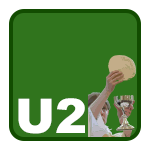
For those of you who didn’t know, I worked this year for my field placement at an Episcopal Church: Church of the Holy Nativity. It’s amazing how much change a small parish can make when they have around 110 people at worship on Sundays.
The U2Charist. These worship services have become a fad for Episcopal and Lutheran churches and we weren’t ashamed to try one for ourselves. The U2 catalogue contains the anthems that could make up hymnals for the faith of many Christians. Using them in worship seems as natural as using Psalms in prayer. Aimée (my boss) and I went to a different U2Charist service last spring and thought we could do one at CHN if we built up to it. We did it.
The evening was a MAJOR success. We had over 180 people and the attendees donated over $3000 for our two charities: Episcopal Relief and Development and Opportunity International.
U2Charists can happen successfully with little planning; but, as with all ministry, the more work that goes into them the more meaning can come out. How much planning did it take?
 Aimée foreshadowed it to the church an entire year in advance. Back when I was just visiting the church as an attendee (but late enough we knew I’d be back this year as an intern), Aimée had the church dream up future special events they wanted to do. She planted the U2Charist and it stuck. At least two of the volunteers on the planning team had been mulling it over since that announcement!
Aimée foreshadowed it to the church an entire year in advance. Back when I was just visiting the church as an attendee (but late enough we knew I’d be back this year as an intern), Aimée had the church dream up future special events they wanted to do. She planted the U2Charist and it stuck. At least two of the volunteers on the planning team had been mulling it over since that announcement!
But just giving a year’s advance warning wasn’t enough to help our congregation understand why we do a different worship service. The messages of many of the U2 songs have to marinate before people can draw the links for themselves between the mission they hear on Sundays, the music they listen to on Tuesdays, and the special worship experience we had on that Friday.
So we started the education process early; five months early, to be exact. Back in January, Terry Johnson and I led and organized the “Living into the Millennium Development Goals” adult education series. We split the goals for one every other week – with intro and final reflection sessions – so our congregation could command and conquer them in the full goal of eliminating the world’s extreme hunger and poverty — or at least know how we could try …
I was particularly proud of the reflection process we spurred in people at the beginning of the series. We handed out labels with statistics and reflection questions so people could put them on whatever they normally read and think about the goals at times beyond Sunday mornings. Think of it: have a magazine you peruse at the breakfast table but one author in there seems like he just tarnishes the luster of that literary gem? Well, cover it up with the stickers! Have those extra blank spaces on your refrigerator calendar just because the month didn’t end on the last day of the week? Well, cover them up with stickers!
The series lasted for five months. We tapped lay leaders to help lead sessions on most of the goals. For instance, one of our members who’s a leader at a Chicagoland literacy non-profit led our session on Universal Primary Education. One of our members who works at Argonne National Laboratory teamed up with another member who does landscaping to lead the session on Environmental sustainability. The training was happening, and the church was preparing  itself for the worship service, and more importantly, what will happen after the worship service.
itself for the worship service, and more importantly, what will happen after the worship service.
The plug-n-play team of eight members showed up when they could, took on responsibilities as they felt able, and pitched in to plan every detail of the event. They deliberated on meta-event questions, like “who should the money go to?” and “what are the resources in scripture and in the songs that  are the backbone of the worship service?” They on micro-event questions, like “is there a way to move the first four rows of pews out so that people can sing and dance but everyone can still see the communion table?” and even better, “what should we do if we get too many people? Do we have overflow areas and ways to still include them?”
are the backbone of the worship service?” They on micro-event questions, like “is there a way to move the first four rows of pews out so that people can sing and dance but everyone can still see the communion table?” and even better, “what should we do if we get too many people? Do we have overflow areas and ways to still include them?”
So our planning started with two requirements: 1) listening to recorded music could get lame and boring, so we needed a live cover band, and 2) the U2Charist would happen at the end of the spring at a date that worked  for the cover band. Oh, and there was another blessing for the service – an offering had to be taken to support work on the MDGs (apparently this was part of the reason U2 let these services happen without charging royalties).
for the cover band. Oh, and there was another blessing for the service – an offering had to be taken to support work on the MDGs (apparently this was part of the reason U2 let these services happen without charging royalties).
 The cover band turned out to be GREAT. They called Elevation and they band members are from the Chicago and St. Louis areas. The lead singer, “Danno” (real name = Daniel) knows how to work a crowd and knows how to make the music fun. I was running the on-screen lyrics and graphics for the group and knew the songs well enough I didn’t need to look at the group continually, which turned out to be full of surprises, like when I looked up and Danno was at the top of the loft singing with the youth. Or like at the end when I looked up and he was in the middle of a conga line snaking its way around the sanctuary.
The cover band turned out to be GREAT. They called Elevation and they band members are from the Chicago and St. Louis areas. The lead singer, “Danno” (real name = Daniel) knows how to work a crowd and knows how to make the music fun. I was running the on-screen lyrics and graphics for the group and knew the songs well enough I didn’t need to look at the group continually, which turned out to be full of surprises, like when I looked up and Danno was at the top of the loft singing with the youth. Or like at the end when I looked up and he was in the middle of a conga line snaking its way around the sanctuary.
The night was capstoned in a comment I heard from one of CHN’s most energetic parishioners. She went up to Danno, and didn’t say, but shouted at him: “I don’t know a single one of these songs, but that was awesome! This is one of the most exciting nights of my life.”
And then she gave him a huge hug. But it turns out that it wasn’t the last time she would see the group. This was a Friday night, but then they were performing the following night at a nearby town’s Irish Pub and the next week they were performing at Navy Pier. She took her daughter and granddaughters and at the Navy Pier gig, Danno even called one of the granddaughters on stage to sing with him. The whole “epic” nature of it is kind of funny.
Oh, and I HAVE to mention why we had such great pictures for the event. One of my high school youth group members at CHN, Lucas, was willing to use my camera after I shoved it onto him. He did marvelously!









